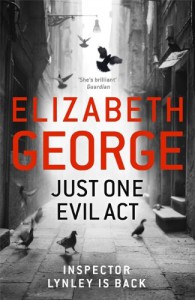Rene Hasekamp
I read books (and place a review here afterwards) in the following categories Mystery/Detective, British literature (mostly older books, from Gutenberg.org), Adventure, some Dutch lieterature and more.
My top favorite writers are John Galsworthy, Wilkie Collins, Charles Dickens, but among my five-star reviews you will also find (debuts of) contemporary writers. A recent example is Gillian Flynn. I mostly read ebooks.
Currently reading
Good, but different from the old Lynley novels

This is the second Inspector Lynley novel in a row that I read. If you read my former review, you know why: Elizabeth George broke off one storyline at the end of the former book, and so "stimulated" het readers to buy the next one as well.
This is the next one, and if i am not wrong, it is the longest Inspector Lynley novel so far. Over 700 pages. The book consists in fact of two parts. The first problem is solved almost exactly in the middle of the book. Near its solution there are some interesting twists. Then comes the second problem. That one also has some twists, but it is not as unexpected as it looks. Especially Barbara Havers, who plays a large role in that second part, thinks in the right direction and in fact solves the mystery.
The book is mainly set in Tuscany (Italy), which is quite refreshing. In the first part Lynley plays a major part, but it is Havers again who does most of the detective work. In the whole novel Lynley in fact does not solve anything.
However, Barbara Havers, although she brings most of the problems to a solution, is balancing on the edge of what is allowed to do as a police person in this novel, and it would not have surprised me if she would have disappeared from the Lynley novels completely after this book. But this is (luckily) not what happens. Why just three stars then? To give one reason: there is no real planned murder in this book, like there was none in the former Lynley novel. If that is the new trend in these novels, I think George should reconsider this. After you finish a police novel without a real planned murder, you do not feel very satisfied. The problems in this novel are both solved and the secondary lines are correctly finished, but you are left with a bit of an anti-climax.
There are some interesting new characters in the book, such as a private detective in London, who plays his "game" not really as he should have done, and the Italian scenes are written very well. But in my opinion three stars is well rewarded for this book.







